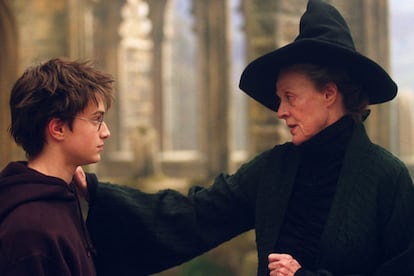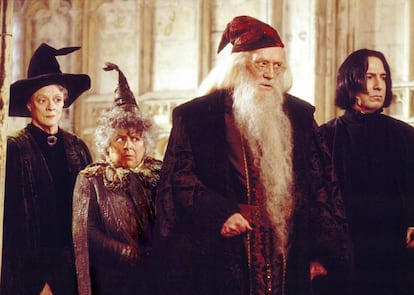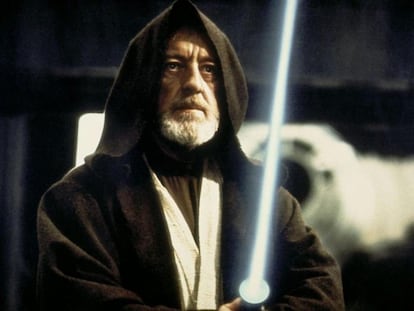Maggie Smith would hate for her legacy to be ‘Harry Potter’: The curse (and blessing) of succeeding in a franchise
The actress’s death has reopened the debate on how the most commercial movie sagas overshadow the careers of veteran actors such as Donald Sutherland and James Earl Jones


“Sad to think that an entire generation of great British actors will primarily be remembered for playing bits in Harry Potter films,” said former New York Times critic and now film curator at the Museum of Modern Art in New York, Dave Kehr, in a message on X last week after the death of actress Maggie Smith, remembered in the headlines of many obituaries as Professor Minerva McGonagall in the adventures of the boy wizard, above the many brilliant leading roles she played in her long career in film and theater, during which she won two Oscars and five Baftas. The list to which Kehr referred includes Alan Rickman (who played Snape), Michael Gambon (Dumbledore) and Robbie Coltrane (Hagrid), actors who have died in recent years and whose obituaries were also marked by their participation in the fantasy saga.
Following Smith’s death last Friday at the age of 89, a group of fans descended on the Harry Potter theme park in Los Angeles to pay their respects. The actress would surely have hated the charade. The Gosford Park star also scorned the global fame that came with her role in the Downton Abbey series. In 2017, she protested at the British Film Institute because she had not been able to go to the supermarket or an exhibition without causing a fuss since she started working on the production. “I’d go to theaters, I’d go to galleries, and things like that on my own. And now I can’t. And that’s awful,” she said. She was so disconcerted by this lack of anonymity that she did not attend the reunion to mark the 20th anniversary of Harry Potter, nor did she collect the awards she received for the role in the U.S.
Coltrane, on the other hand, was happy to accept the fans’ effusive affection: “You could be watching [Harry Potter] in 50 years time, easily. I’ll not be here, sadly, but Hagrid will,” he said emotionally months before he died.

It is not an isolated or recent phenomenon. Angela Lansbury’s role in the series Murder, She Wrote was highlighted when she died, leaving her career on Broadway in the shade. Alec Guinness never hid his discomfort at the relevance that his role as Obi-Wan Kenobi in Star Wars had on his public image. The British actor was not happy that the Jedi master overshadowed characters like Colonel Nicholson in The Bridge on the River Kwai.
“I shrivel inside each time it is mentioned. Twenty years ago, when the film was first shown, it had a freshness, also a sense of moral good and fun. Then I began to be uneasy at the influence it might be having,” said the actor in his memoirs, A Positively Final Appearance, when he recalled how a 12-year-old boy who said he had seen the film 100 times approached him.
The actor asked him not to watch it again: “Looking into the boy’s eyes I thought I detected little star-shells of madness beginning to form and I guessed that one day they would explode. He burst into tears. His mother drew herself up to an immense height. ‘What a dreadful thing to say to a child!’ she barked, and dragged the poor kid away. Maybe she was right but I just hope the lad, now in his thirties, is not living in a fantasy world of secondhand, childish banalities.”
With the proliferation of sequels and franchises, what Guinness experienced has become common among cinema’s elder statespeople. Today, legends of his stature are often hired by studios to add a patina of respectability to these productions. Donald Sutherland’s stellar career was underscored when he died in June by his role in The Hunger Games. James Earl Jones, who died a month ago, has transcended as the voice of Mufasa in The Lion King and that of Darth Vader.
Fans gathered in front of Hogwarts Castle tonight to raise their wands up in tribute to Dame Maggie Smith pic.twitter.com/wv2F1c8yQo
— Adventuring with Annie (@AnniesUniUpdate) September 27, 2024
It is something that Leonard Nimoy, who died in 2015 at the age of 83, also struggled with. In 1975, he wrote the biography I Am Not Spock, in which the actor, director of Three Men and a Baby, painter and photographer tried to build his identity beyond his character in Star Trek. “I was so heavily typecast and so heavily identified with the Spock character, it was difficult to draw attention to the other work that I wanted to do,” he acknowledged in 2008. Later, however, he returned to the Star Trek saga, directed two films in the franchise, spread the message of peace and exploration of the USS Enterprise and never missed a convention: “Typecasting is a double edged sword. Yes it does preclude you from being offered certain kind of work, but at the same time it gives you an identity. And that identity in the acting business can be very useful. I have never been out of work since Star Trek went on the air. I have never needed to look for a job.” In 1995, he wrote another book: I Am Spock. In his final days, he signed his Twitter messages with “Live long and prosper,” echoing his character.
It can be frustrating for actors with long and distinguished careers to be remembered for a supporting role, but sometimes a character becomes an icon for a generation, establishing a strong emotional connection, to the point that they end up becoming parasocial friends in the minds of fans. Harry Potter, in particular, is a franchise that millennials and now generation Z have connected with. Minerva McGonagall is imprinted in their memories as much, or more, than the real teachers they had at school.

The debate also involves the generational struggle, where a recent character can end up overshadowing older ones whose memory has not survived the test of time, regardless of their quality. If for some Patrick Stewart will always be Captain Picard of Star Trek, for some younger people it will be impossible to separate him from Professor Xavier of the X-Men saga, while a few others will point to his extensive work in theater and television. The same is true of Ian McKellen, although the headlines always lean on Gandalf from The Lord of the Rings or Magneto in X-Men.
A franchise can overshadow, but it doesn’t eliminate everything else. Harry Potter fans might be curious to see Maggie Smith in other films like California Suite, or Donald Sutherland in Bernardo Bertolucci’s 1900 or Ordinary People. In his final days, Leonard Nimoy made clear his commitment to Spock’s legacy. The character would transcend him: “I’m very grateful. It’s better than being forgotten,” he acknowledged. He knew that he would not go down in history for his varied career, but rather understood that all the obituaries would remember him for Star Trek. He would be a timeless and abstract icon.
Sign up for our weekly newsletter to get more English-language news coverage from EL PAÍS USA Edition
Tu suscripción se está usando en otro dispositivo
¿Quieres añadir otro usuario a tu suscripción?
Si continúas leyendo en este dispositivo, no se podrá leer en el otro.
FlechaTu suscripción se está usando en otro dispositivo y solo puedes acceder a EL PAÍS desde un dispositivo a la vez.
Si quieres compartir tu cuenta, cambia tu suscripción a la modalidad Premium, así podrás añadir otro usuario. Cada uno accederá con su propia cuenta de email, lo que os permitirá personalizar vuestra experiencia en EL PAÍS.
¿Tienes una suscripción de empresa? Accede aquí para contratar más cuentas.
En el caso de no saber quién está usando tu cuenta, te recomendamos cambiar tu contraseña aquí.
Si decides continuar compartiendo tu cuenta, este mensaje se mostrará en tu dispositivo y en el de la otra persona que está usando tu cuenta de forma indefinida, afectando a tu experiencia de lectura. Puedes consultar aquí los términos y condiciones de la suscripción digital.








































